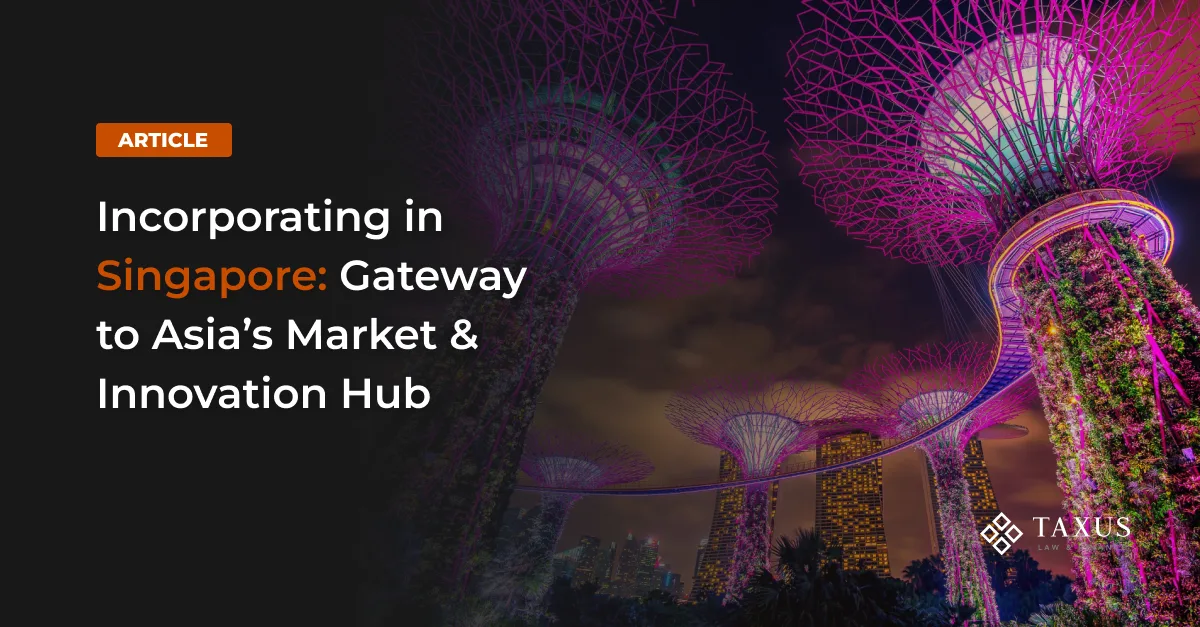Incorporating in Singapore: Gateway to Asia’s Market & Innovation Hub

V. Prysiazhniuk

Is Singapore Right for Your Case? 60-Second Fit Check
Before diving into the nitty-gritties, ask yourself these critical questions to determine if Singapore is right for your business aspirations:
1. Business Structure & Operations:
2. Financial & Tax Considerations:
3. Operational Requirements:
If you’ve responded “yes” to many or all of these, Singapore is likely to have the strategic advantages your business needs to thrive in the Asian market.
Why Start a Company in Singapore: Key Advantages in 2025
Singapore is now the Asian business hub and one of the world’s top competitive economies. As an independent city-state geographically situated at the crossroads of international trade, Singapore offers better access to Asian markets with the best international standards of business operations. This combination of strategic location, world-class infrastructures, and pro-business policies has made Singapore the choice gateway of international entrepreneurs and multinational corporations alike.
Business-friendly environment
According to recent assessments by international institutions, Singapore consistently ranks among the most business-friendly jurisdictions for starting and operating a company.
- Political stability, a robust rule of law, and respected regulators create a secure environment for investment.
- Government grants and funding programs, together with world-class transport, telecommunications, and office infrastructure, make Singapore a highly competitive growth hub across Asia.
- A steadfast commitment to efficiency and transparency has earned the country strong trust from investors and global organizations.
Strategic Location & Market Access
Singapore’s membership in ASEAN gives businesses preferential access to regional free-trade agreements — including with China, India, and other partners — lowering tariffs and opening valuable markets of more than 650 million consumers. Situated on key shipping lanes, Singapore hosts one of the world’s most powerful ports, creating a connectivity network that links businesses with clients and partners worldwide.
Advanced Digital Infrastructure
Registration of Singapore companies is conducted entirely through online portal. This technology-based environment offers streamlined processes and reduces administrative burdens for companies at every stage of their development.
Competitive Tax Framework
Singapore boasts a 17% corporate tax rate complemented by additional tax exemptions that can significantly bring down the effective rate for qualifying companies. Singapore boasts a territorial system with no taxation of capital gains and special treatment of foreign-sourced income, making it extremely alluring to foreign business activities.
When Singapore is the right choice
Because of its superb regulation, advanced infrastructure, and strategic location, Singapore is particularly attractive to the following sectors:
- Technology & Innovation: Singapore has emerged as one of Asia’s leading innovation hotspots, with government backing for R&D spends and startup emergence
- Financial Services & Fintech: Being a global financial hub, Singapore offers a robust environment for established financial institutions and emerging fintech players
- Maritime & Logistics: The world’s busiest port by tonnage provides unparalled connectivity for trade business
- Professional Services: Insatiable demand for legal, accounting, and consulting services driven by the existence of multinational companies
- E-commerce & Digital Services: Strong digital backbone and supportive regulations suiting online firms catering to regional markets
Turnkey launch in Singapore
Business Structures in Singapore
Singapore offers several business structures designed to suit different ownership models and operational needs.
1. Private Limited Company (Pte Ltd).
The most common choice for both local and foreign entrepreneurs is the Private Limited Company. Under ACRA regulations, it requires at least one shareholder and provides limited liability protection. Paid-up capital can start as low as $1, making it accessible for businesses of all sizes. Management is handled by directors, with at least one director required to be a Singapore resident.
2. Public Company Limited by Shares.
Intended for large enterprises seeking to raise capital from the public, this form demands stricter governance, including a board of directors and extensive reporting obligations.
3. Limited Liability Partnership (LLP).
Combining partnership flexibility with limited liability, LLPs are a preferred format for professional practices such as law firms and accounting offices.
4. Sole Proprietorship.
The simplest option for individual entrepreneurs, a sole proprietorship grants complete control to the owner but carries unlimited personal liability.
The choice of company structure depends on:
- Ownership and Growth Plans: Use Employ Pte Ltd in most business operations requiring growth capital, Public Company for large capital-raising programs, and LLP for professional bodies
- Liability Protection: Pte Ltd and LLP entities provide limited liability protection to owners, while sole proprietorships entail unlimited liability
- Regulatory Requirements: Pte Ltd possesses balanced requirements of compliance suitable for the majority of global businesses, while public companies possess more extensive disclosure requirements
- Tax Efficiency: All entities benefit from Singapore’s low tax rates, with Pte Ltd companies benefiting from the largest number of incentive schemes available
Steps to Register a Company
- Reserve a Name.
Select a unique, professional name that isn’t identical to existing businesses, doesn’t infringe trademarks, and avoids offensive or restricted words. Submit it through online portal; compliant names are usually approved within one business day. - Draft the Constitution.
Prepare the company’s constitution, which defines its objectives and operating rules. ACRA provides model templates, but custom versions can be used. - Submit Incorporation Documents.
At this stage, we prepare the company’s constitution and submit all necessary details through online portal. Standard applications are usually processed within 2 business days, but we can create a customised version tailored to your specific business needs. - Receive Official Documents.
After approval, the company is issued a Unique Entity Number (UEN) and a Certificate of Incorporation. A Business Profile summarizing key details is also provided. - Set Up EMI & Licences.
To begin operations, we recommend opening an EMI account. If your business requires licensing, we also assist in preparing and submitting all necessary license applications at this stage.
Singapore vs Hong Kong: A Strategic Comparison
When it comes to selecting between Asia’s two top financial centers, knowledge of the essential distinctions makes the decision better suited to your business model.
| Criterions | Singapore | Hong Kong |
| Company formation | Requires at least one resident director (citizen, PR, or valid pass holder); local secretary and registered address required | No resident director requirement; local secretary and registered address required |
| Remote setup | Yes | Yes |
| Corporate tax | Flat headline rate with substantial exemptions that can materially reduce effective rates for qualifying companies | If there is no profit generated in Hong Kong, no tax is payable. |
| Indirect tax | GST applies on local supplies | No GST/VAT |
| Market focus | Gateway to ASEAN and Southeast Asia’s consumer base | Gateway to Mainland China and the Greater Bay Area |
| Stability & policy orientation | High policy stability, structured regulatory environment, strong IP and R&D incentives | Proximity and integration with Mainland China’s economic policies; strong capital markets |
| Digital processes | Comprehensive online incorporation via a unified government portal | Efficient online incorporation; processes are streamlined |
| Innovation & startup support | Extensive programs and grants for startups, tech, and R&D | Strong financial hub with growing support for priority innovation sectors |
| Government fees & costs | Government fees are moderate | Government fees vary |
| Best fit | Tech, IP-heavy, regional HQs targeting ASEAN scale-up, marketing, fintech | China-centric operations, trading, traditional financial services, marketing, fintech |
Conclusion
Whether or not to establish your company in Singapore is entirely a matter of strategic intent and operational needs. If your strategy is to access Southeast Asia’s dynamic consumer markets, tap the high innovation incentives, and benefit from a transparent regulatory system, Singapore offers an unmatched combination of stability, infrastructure, and specialized services for startups and high-growth companies. Its streamlined digital onboarding, generous tax incentives, and ubiquitous network of free trade agreements create an environment where new and established companies can expand rapidly across the region.
Conversely, if your most significant concern is direct market access to Mainland China, low indirect taxes, and remote setup flexibility, Hong Kong is better aligned with your objective. For a full step-by-step breakdown, see “Hong Kong Offshore Company Setup”.
Both jurisdictions have streamlined incorporation, strong legal protection, and sophisticated financial ecosystems—so the optimal option will therefore depend on whether your expansion approach has ASEAN-wide expansion or China-centric operations as your priority.
By aligning your market entry strategy, ownership structure, and long-term growth plans with the unique strengths of each jurisdiction, you can ensure that your choice of incorporation offers a solid platform for sustained success in the competitive Asian setting.
By contrast, if your priority is direct access to Mainland China, minimal indirect taxes, and maximum flexibility for remote incorporation, consider Hong Kong.

Quick consultation: Singapore or Hong Kong — which fits your case?

Looking for a reliable payment processing system?
Order selection of a payment solution.









